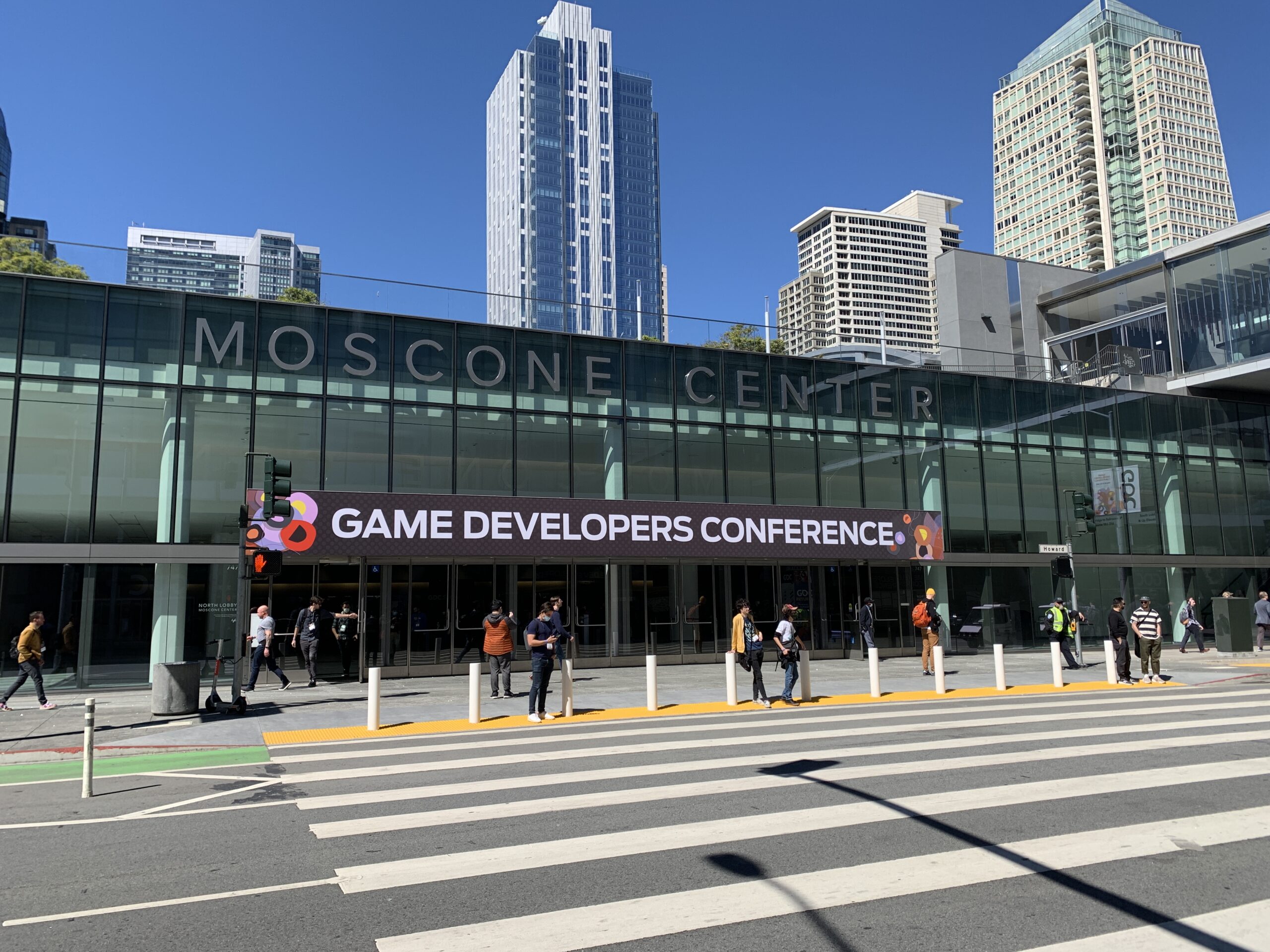In February 2020, Jennifer Hernandez was gearing up to head to San Francisco for the Game Developers Conference (GDC), one of the biggest events of the year for her concept art design firm, when word came down that it was being cancelled.
“We were shocked,” said Hernandez, a director of business development for Los Angeles-based West Studio. “That was at the beginning of the lockdowns happening and everything went virtual after that.”
Now, two years later, Hernandez was back in the city, snapping selfies with her boss at a bridge overlooking Howard Street, on a sunny Monday afternoon.
This week, GDC made its grand return to Moscone Center after two years in a Covid-induced virtual format, marking the first major tech conference held in San Francisco since the pandemic decimated the group travel industry. This year’s iteration also has a virtual option, but organizers say that registrants overwhelmingly chose to attend in person, with only about 10% of registrants choosing to stay online.
“It definitely signals a turning point of sorts, just getting back into a routine and getting back to where we were, because honestly, we went into a black hole for two years,” Hernandez said.
The conference, which runs from March 21 until March 25, is expecting some 14,000 in-person attendees. The figure is around half the 29,000 attendees the conference saw in 2019, but double the size of the next largest event held at Moscone Center during the pandemic, according to Leonie Patrick, SF Travel’s vice president of convention sales.
“It’s the same month two years ago where everything fell apart for all of us,” Patrick said.
“It’s not just a hospitality thing, it’s revenue coming into the city,” she added. “When I was out there this morning, people were stopping me and asking what conference is in town. Residents are excited to have people back in the streets again.”
In 2019, convention travel supported about $2 billion in spending in the local economy, including 970,000 room nights booked at the city’s hotels across 49 events held at Moscone Center.
Over the pandemic, those numbers have dropped precipitously: In 2021, only 18,000 rooms were booked for five events conferences held at the convention center last year. This year, 35 events are currently booked at Moscone Center.
Across the street from the convention center, Jordon Weismann was tucking into a noodle bowl from Vietnamese restaurant Freshroll. Weismann, a director at the mobile app marketing company Mooko, had attended a GDC a number of times before. This year’s event carries particular weight, he said.
“There’s definitely pent-up energy in trying to get back out and do business the way we used to do it,” Weismann said. “You don’t become a salesperson so you can sit behind your computer and email people all day from your house, right?”
The restaurant itself was full of conference attendees, identifiable by their black lanyards and conference badges. A Freshrolls worker estimated that their business on Monday was about double that of a typical Monday lunch rush.
“Coming back here, it feels very similar,” Weismann said. “It feels very normal outside of just everybody wearing masks inside of the show.”
The masking requirement at the conference’s indoor events are one of the health and safety adjustments organizers made this year, along with requiring booster shots or a negative test. Earlier this month, Moscone Center opened its Covid Testing Center, which offers PCR tests for conference attendees and tourists for a fee. While GDC is offering its own rapid antigen testing for attendees, Patrick said the on-site Covid testing center is intended to help event organizers to more easily comply with shifting Covid rules.
She added that starting on April 1, San Francisco will bring its policies in line with statewide rules and drop mask, vaccine, testing requirements for large indoor events.
Still, even as signs of normalcy return, there were some striking differences compared to a typical, pre-pandemic gaming conference. Yu Murakami, director of global business strategy for Tokyo-based mobile advertising company Zucks, said one difference he noted about this year’s event is far fewer visitors and exhibitors from Asian countries like Japan and South Korea.
Murakami’s observation echoes larger trends facing San Francisco’s tourism industry: As of December 2021, international enplanements at San Francisco International Airpot were still tracking at only 40% of 2019 numbers, according to SFO data.
While Patrick said bookings are not where they would be in a normal year, she has been seeing more relatively last-minute inquiries in recent weeks from organizers looking to book available time in Moscone’s typically crowded calendar.
Forthcoming conferences at Moscone Center include the annual World Education Congress, scheduled between June 21 and June 23 at Moscone Center and expected to host thousands of professional meeting and event planners from around the world.
“I think seeing is believing and having them here and seeing it for themselves is extremely important,” Patrick said.
